- Home
- Jen Lancaster
I Regret Nothing: A Memoir Page 24
I Regret Nothing: A Memoir Read online
Page 24
Every inch of the narrow strada we’re currently on is picture-postcard–worthy, with fascinating vignettes as far as the eye can see. To our right, there’s a couple of grizzled old priests smoking, laughing, and drinking red wine at a little iron bistro table. There’s a joke here, I think, and it begins, “Three priests walk into a bar.” What’s their story? Did they just get off work? Are they employed by the Vatican? Does that job come with dental? Are they friends with the new Pope? (I suspect yes—Francis seems kind of awesome.) Do they desperately miss Saint John Paul II or are they frankly just relieved to be done with the interim guy who was so scowl-y?
To our left, a skirt-clad, scarf-wrapped Roman mama purposefully pedals her bike with an adorably pink-cheeked toddler in the seat on the back. She has a basketful of gorgeous produce and fine bread balanced in front. (No one wears bike helmets here. No one. It’s like Milwaukee!) It’s all I can do not to follow her home and beg to eat whatever she’s cooking for dinner.
Please, God, let it be eggplant.
Plus, it’s jasmine season, so the blooming flowers provide a heavy perfume that blankets the city, mingling with the scent of thousands of years of sandalwood and frankincense emanating from all the old churches. Someone should bottle the fragrance of Rome in June; they’d make a fortune.
In terms of sensory overload, we’re still reeling from the perfection that is the Sistine Chapel ceiling, even if its magnificence renders everyone incapable of shutting their yaps. I still can’t believe we’re surrounded by the kind of splendor that assaults every single sense.
Still . . . the coffee thing is getting to us.
“I feel like you pulled a bait and switch,” Fletch says, as we plod down the street, two pilgrims on a quest for liquid salvation. We both heeded everyone’s advice and are wearing fine walking shoes, and thus far, no one’s turned an ankle or formed a blister.
(Sidebar: Another Roman observation? You can’t buy a pair of stilettos in this city. Impossibly high platform sandals abound, but there’s nary a spike or kitten heel to be seen. I like thinking that I can’t manage heels because my ancestors never walked in them, even though it’s more likely due to my comorbidity of poor balance and weak core muscles.)
“How so?” I ask.
“You lured me here under the pretense that I’d spend my days swilling java, but they make it almost impossible.” He qualifies his statement. “It’s worth it, but it’s still hard.”
He’s right, too. Who knew coffee would be such a challenge in Italy? I mean, isn’t this the birthplace of the modern espresso machine? A couple of days ago, before Fletch arrived, I found a Nespresso shop by the Spanish Steps and I was so excited that I had to take a picture for Julia, who fell in love with my unit last Christmas and finally had to get one of her own.
Coffee is not easy here. In fact, coffee is so freaking hard. (One could argue that coffee is for closers.) For some reason, I assumed Rome would be an enormous Starbucks, only a million times better. My best guess was that espresso would be as free-flowing and abundant as the fountains dotting the streets. There’d be coffee places on every corner and we’d stroll around the city with our giant cups, admiring the scenery while we sipped the finest brew on Earth. And, because we’re a tiny bit smug now—like no one saw that coming—we’d be laughing about all those unenlightened saps at home drinking their stupid, subpar American coffee.
Ha, ha, ha, no.
Easy access to coffee is not the case in Italy.
At all.
The whole getting-coffee process is incredibly complicated, at least for the first-timer. Coffee procurement is an entire procedure and there are distinct rules. And no one tells you the rules; they expect you to know them already. For example, there are scads of cute little outdoor cafés (except, apparently, in this ten-block radius on the wrong side of the Vatican), but you don’t usually see anyone except for tourists sitting at them because the real Italians are all inside crowded at the bar.
To order coffee in Italy, you have to master the steps. First, you go inside and you place your order with the cashier, where you’ll note that Starbuck-y tweaks such as half-caf-soy-extra-hot-skinny-shot-of-hazelnut are not even a consideration, let alone a viable option.
The cashier will grudgingly take your money, but he won’t actually hand your change back to you, instead depositing it in a small dish, even if your hand is right there and in position. I’ve yet to figure out what purpose the dish holds, but maybe in a city where the plague was an actual thing, they don’t touch people when not absolutely necessary?
After you pay, the cashier gives you a chit and you take said chit over to the baristas’ area. This separation of church and state makes sense in terms of sanitation because they don’t want the people who handle the money to also put their paws on the food and drink. (Again, plague-related?)
As Chief Watch Captain of the Health and Safety Patrol, I’d be one hundred percent behind this system, except that at any point in time, there will be eight thousand people crowded around said coffee bar, because (a) the cashier is super fast, what with throwing your change in a bowl instead of counting it back to you, (b) the baristas are in no hurry whatsoever because this is Italy and, for better or worse, they take their damn time, (c) they serve your beverage in real cups; ergo, you have to drink it inside the shop, unless you want to pay more to have your coffee outside, and (d) Italians are not big on the concept of “lines” so there’s a mass of humanity all clustered together on the floor of this very small shop, with no rhyme or reason as to traffic flow.
See? The coffee process is already unduly complicated.
Because there are dozens and dozens of other patrons between you and the barista, you have to wait for one of them to finally acknowledge you. And as there’s no line, there’s no set way of deciding who’s first and whoever receives their coffee next is based on a completely arbitrary and capricious set of rules. I’ve found that if you give them a really big, creepy, toddler-beauty-pageant smile, they go faster, largely because it’s so off-putting.
So, when you and your chilling rictus finally get the barista’s attention, you hand him your slip, which is when you specify if you want your drink served with or without sugar, which is yet another mystery.
Is il zucchero a precious commodity in Italy? I suspect it may be; otherwise, why wouldn’t they let you sweeten your coffee yourself?
(Sidebar: This is also my problem with the Dunkin’ Donuts corporation. I guarantee you I know how to lighten and sugar my coffee better than the surly person behind the counter who looks at my cream consumption as both an insult and a challenge.)
(Additional sidebar: Last year I went to Dunkin’s on Memorial Day at ten a.m. to buy doughnuts and they were sold out. How do you sell out of doughnuts? The cashier suggested that I might rather have ice cream from the attached Baskin-Robbins. Hell, no, I don’t want ice cream! Not eating breakfast ice cream is the only thing that stands between me and not needing a crane to knock down a wall so that I can leave the house! I mean, breakfast cake on vacation is one thing, but breakfast ice cream? No. If it’s ten a.m. on a holiday weekend, I want crullers and bismarcks and fritters, damn it! Come on, Dunkin’ Donuts, you had ONE JOB here.)
Ahem.
Anyway.
So, you’ve finally run the order decathlon and oh, happy day, your coffee is coming! When it arrives, don’t expect a big paper traveling cup or even a standard-sized mug. Instead, your coffee will be served in a delicate little demitasse the size of an eye bath. I’m not kidding. Even if you order something other than espresso, you get maybe six ounces, as opposed to the Starbucks Trenta, which is thirty-one ounces of pure USA! USA! USA!
Then, you’ll stand there and imbibe your thimbleful of coffee, which is the greatest possible thing you’ll ever put in your face, thus making the entire tribulation worth it. The full-bodied richness of this heady concoction commingles
with the smoky undertones, somewhere between chocolate and tobacco, melting onto your tongue, without even a thought of bitterness or acidity.
As you sip, the woodsy notes become more defined, with hints of the same florals so perfuming this ancient city. The regular old milk from Italian cows is far richer and more resplendent than any heavy cream from Wisconsin’s finest and the barista was right to portion out your sugar for you, as he’s stirred in the perfect proportion, down to the very grain.
The reasons Italians make the best coffee in the universe are a subject of much debate—some say it’s because they hand-pump the espresso shots, while others argue it’s the roasting process, which allows the beans to caramelize. Perhaps it is the minerals in the water that turn an average breakfast beverage into alchemy. Others will insist that half the battle is the scenery surrounding the coffee shop. My guess is it’s all these factors combined.
One could argue that the Italian cup of coffee is proof that God exists.
I won’t disagree.
Anyway, your impulse will be to savor this nectar of the gods, this potable ambrosia, to take each sip and hold it in your mouth while it warms your soft palate, allowing the rich goodness to penetrate every taste bud and fill your sinus cavities with delectable, aromatic steam.
Instead, you’ll have to swill it down as quickly as humanly possible in order to make way for the hordes of impatient Italians behind you, who are all staring holes in your back, you slow-sipping- doughnut-munching-Rockport-wearing-fanny-pack-having-sugar-hoarding-spaghetti-cutting-American-motherfucker.
Mind you, you could have this same exact experience outside at a table, without all the dirty looks and elbows to the kidneys and plague fears, except the waiter has chased a pretty girl from Singapore down the street in order to flirt with her and it’s going to be next week before he even acknowledges your existence, let alone takes your order.
Still, and I can’t stress this enough: The coffee is worth it.
We continue to traverse the little cobblestone streets and we’re just about ready to give up and grab a cab when we spy a glint of a copper espresso maker inside a restaurant on the corner across from a gelato shop. We step inside the pristine storefront to order, finding it delightfully empty. Noting how hot and haggard we are, the barista suggests we sit outside and enjoy our drinks, sending a non-Singaporean-chasing-waitress to seat us immediately. Fletch asks for a caffè macchiato and I order a caffè freddo, which I assume is an iced coffee.
I assume wrong, but this is yet another in a series of happy Roman accidents. Instead of receiving a big glass of coffee over ice that I can doctor with the Italian version of Splenda and milk, I’m served what’s essentially a straight-up, shaken coffee martini, less the liquor.
This turns into one of those moments on the trip when we’ve inadvertently veered off the beaten path, only to discover something we never expected yet suddenly can’t imagine ever living without. Somehow this barista managed to compile everything that’s remarkable about a big-assed iced coffee, and compress it into one simple drink that is espresso at its very essence.
Fletch raises his miniature teacup at me. “If this macchiato is any indication, then we definitely need to eat something here,” he declares.
We order a couple of pizzas—Fletch has his with prosciutto and I get the one with bresaola (slices of air-dried, salted beef), rocket, and Parmesan. While we wait for our food, we continue to bask in the scenery.
He asks, “Have you decided if this is your Best Day yet?”
I’m not hot to the point of expiration now, thanks to the power of my chilly glass of miracle juice, so I’m able to better consider his question. After arriving on Italian soil, I amended my bucket list to have a go-to greatest day of my life for when people ask. Seems like everyone has an example, like, “That time we were scuba diving in the Galapagos Islands and narrowly escaped the Great White,” or “When my son was born,” or “Our wedding day,” but I’m not PADI certified, we don’t have kids, and our wedding? Was an unmitigated disaster. Thus far, I’ve had an awful lot of nice days in my life, but I’m not sure I can say that any of them have qualified as The Best.
The Best Day doesn’t necessarily have to be conflict-free or picture perfect from start to finish. Rather, said day should contain a variety of experiences and sensations. Plus, the day’s events could illuminate an answer to a long-asked question. A Best Day definitely will provide the fodder for a story I can tell for the rest of my life.
So far, today’s been pretty damn good. Our morning began with another wonderful breakfast, including mortadella, buffalo mozzarella, and fresh blood orange juice so sweet that you’d swear it was Hawaiian punch. Then, I was still tired, having finally succumbed to the jet lag, so I sent Fletch out on his own while I rested. I watched Italian television and couldn’t believe my fine fortune upon discovering Vecchi Bastardi (Old Bastards), which is essentially their version of Jackass meets Betty White’s Off Their Rockers with oldsters pulling pranks on young punks.
Fletch returned to the hotel a couple of hours later with more new clothes, delighting again in how everything here fits him perfectly. Plus, this was the first time he tried to find his way around the city on his own. He went out with the intention of buying a couple of ten-euro belts he’d seen, but instead he allowed a salesman to talk him into a sweet pair of navy blue loafers.
I’ve been shocked at how easily Fletch has been trying new things and calmly navigating all that’s uncertain. When at home, he’s not so great about relaxing, but here? He is Mr. Chill. He is Dr. Cool. Twenty years after we first met, he’s still able to surprise me! That alone practically qualifies as Best Day material.
Add the Vatican trip into the mix, with the agony of sweat rolling down the crack of my ass while coupled with the ecstasy of a once-in-a-lifetime experience, and we may well have a Best Day contender.
“Maybe,” I gamely reply.
He smiles and holds my hand as he takes a sip of his macchiato. The foam sticks to his mustache, which is apparently by design. Honestly, I suspect he likes having his whiskers trap the flavor for a future savor.
“Maybe? What are you talking about, maybe? We’ve seen everything good. We’ve seen the whole city! We went to a museum—we saw priceless works of art! We ate pancreas!” he says, quoting one of my favorite lines from Ferris Bueller’s Day Off. “Screw your maybe. Today’s a keeper for me.”
We content ourselves with our drinks as we look around. “You know, this area feels like what Rome really is,” I say. “We’ve seen so many monuments and so much tourist stuff that I’m not sure we’ve gotten enough of a taste for what it’s like to actually be Roman, to live here. Like, when people come to Chicago and they check out the Bean and go to Navy Pier? Yeah, the sights are landmarks but visiting them doesn’t give you a sense of what it’s like to live in Chicago. Do you understand what I’m saying?”
Fletch nods, and catches his upper lip with his lower lip, checking for stray foam. “Sure, it’s the difference between eating lunch at a nice chain restaurant on Michigan Avenue versus having brunch outside at Lula’s in Logan Square. One isn’t better than the other, per se, but the latter is where the actual Chicagoans are. When you go somewhere new, you want to get an idea of how they live.”
He’s right; I’m perpetually fascinated by how other people go about their lives, especially in new places, to the point I wish I could peek in their windows in a nonthreating-or-illegal way. I’m desperately curious whether they know something I don’t, and if so, can they teach me? And what makes them tick? What guides their choices? Why this house, this neighborhood, this city, this job, this spouse? What’s important to them? How do they avoid regrets? In what ways are they trying to live their lives to the fullest?
(Sidebar: I suspect these questions are why I’m so fascinated by reality television. Yeah, I’m a small enough person to admit I enjoy seeing the bitch
who’s not here to make friends have her extensions yanked in a pique of rage, but that doesn’t negate how fascinated I am with what happened in their lives to lead them to the extensions-yanking portion of the show to begin with.)
So, naturally I have to wonder what it’s like to live in the very cradle of civilization. Do the Romans exist in a perpetual state of wonder, all, “My God, this is freaking stunning!” upon seeing the Trevi Fountain on their way to their jobs as legal secretaries and orthodontists every day? Does it take their breath away to stroll the very paths that Julius Caesar once walked? Or is it human nature to become immune to one’s surroundings after a while? If so, is that the case for both beauty and misery—does everything eventually all become familiar to the point of forgettable?
When I lived in downtown Chicago, I valued having art and culture at my fingertips, but I never really dwelled on what that opportunity meant. Instead, what truly lit my fire were the new and often benign happenings, like when the three-story Whole Foods opened up on Kingsbury Street. Sure, I was grateful to have the option of gazing upon a non-bullshit Matisse painting whenever I wanted, but, honestly, buying organic Rainer cherries had a much larger impact on my day-to-day life.
(Shameful. But honest.)
While we eat and ponder, I notice some action about halfway down the block. “Fletch—check out those guys over there, smoking while they paint the shutters. I love that there’s nothing here that can’t be done with a lit cigarette. I wonder why the smoking doesn’t bother me? Remember the last time we went to Vegas? I wanted to buy a respirator!”
Fletch cranes his head around to see what’s happening behind him, appraising the two men in the distance at their outdoor workstations. One looks to be in his fifties, and the other one is probably in his seventies. Maybe they’re father and son? They’re standing in front of a shutter repair shop, putting the finishing touches on a recent job. Although they’re doing manual labor, they’re both wearing tailored slacks and dressy leather shoes, which neatly encapsulates everything that’s charmed me so much about this place. Rome engenders a certain level of formality and elegance. I bet, unlike me, no one here even owns a pair of yoga pants, let alone spends seventy-five percent of their non-yoga-doing lives in them.

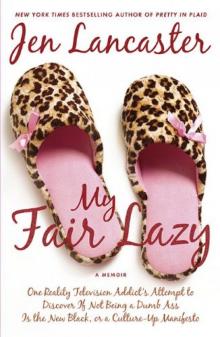 My Fair Lazy: One Reality Television Addict's Attempt to Discover
My Fair Lazy: One Reality Television Addict's Attempt to Discover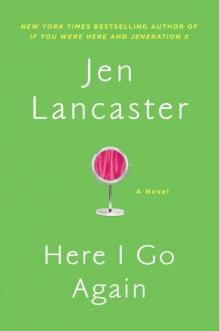 Here I Go Again: A Novel
Here I Go Again: A Novel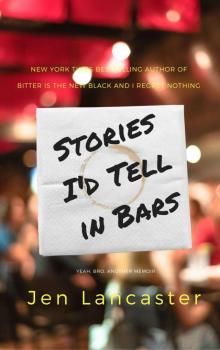 Stories I'd Tell in Bars
Stories I'd Tell in Bars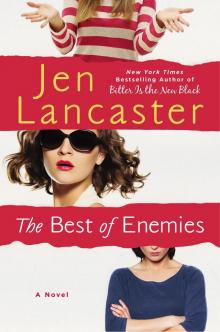 The Best of Enemies
The Best of Enemies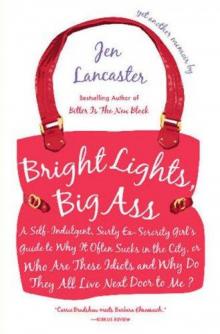 Bright Lights, Big Ass
Bright Lights, Big Ass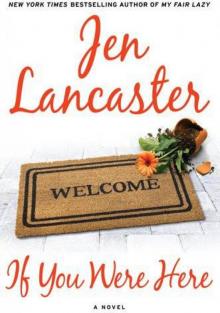 If You Were Here
If You Were Here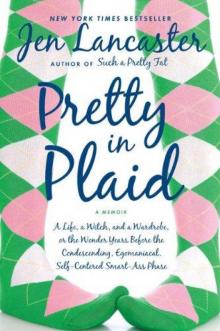 Pretty in Plaid: A Life, A Witch, and a Wardrobe
Pretty in Plaid: A Life, A Witch, and a Wardrobe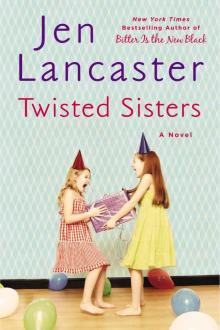 Twisted Sisters
Twisted Sisters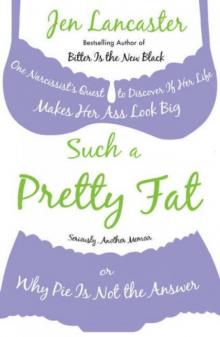 Such a pretty fat: one narcissist's quest to discover if her life makes her ass look big
Such a pretty fat: one narcissist's quest to discover if her life makes her ass look big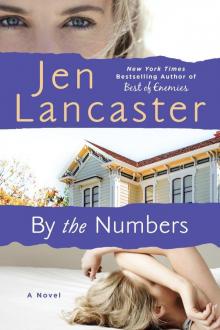 By the Numbers
By the Numbers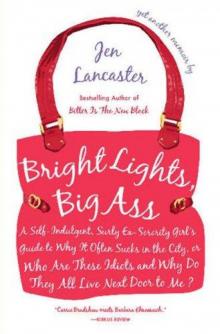 Bright Lights, Big Ass: A Self-Indulgent, Surly, Ex-Sorority Girl's Guide to Why it Often Sucks in theCity, or Who are These Idiots and Why Do They All Live Next Door to Me?
Bright Lights, Big Ass: A Self-Indulgent, Surly, Ex-Sorority Girl's Guide to Why it Often Sucks in theCity, or Who are These Idiots and Why Do They All Live Next Door to Me?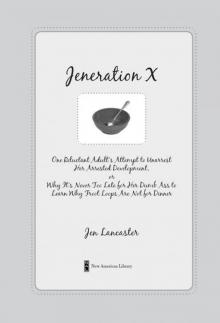 Jeneration X: One Reluctant Adult's Attempt to Unarrest Her Arrested Development
Jeneration X: One Reluctant Adult's Attempt to Unarrest Her Arrested Development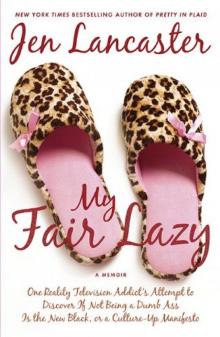 My Fair Lazy: One Reality Television Addict's Attempt to Discover If Not Being A Dumb Ass Is the New Black, or, a Culture-Up Manifesto
My Fair Lazy: One Reality Television Addict's Attempt to Discover If Not Being A Dumb Ass Is the New Black, or, a Culture-Up Manifesto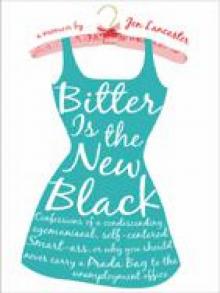 Bitter is the New Black
Bitter is the New Black The Tao of Martha: My Year of LIVING
The Tao of Martha: My Year of LIVING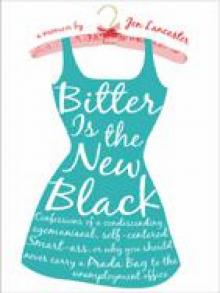 Bitter is the New Black : Confessions of a Condescending, Egomaniacal, Self-Centered Smartass,Or, Why You Should Never Carry A Prada Bag to the Unemployment Office
Bitter is the New Black : Confessions of a Condescending, Egomaniacal, Self-Centered Smartass,Or, Why You Should Never Carry A Prada Bag to the Unemployment Office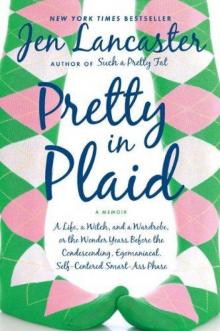 Pretty in Plaid: A Life, A Witch, and a Wardrobe, or, the Wonder Years Before the Condescending,Egomaniacal, Self-Centered Smart-Ass Phase
Pretty in Plaid: A Life, A Witch, and a Wardrobe, or, the Wonder Years Before the Condescending,Egomaniacal, Self-Centered Smart-Ass Phase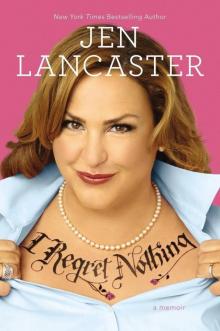 I Regret Nothing: A Memoir
I Regret Nothing: A Memoir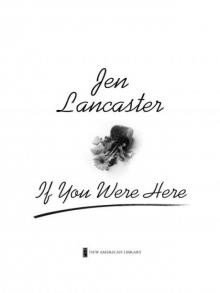 If You Were Here: A Novel
If You Were Here: A Novel The Tao of Martha: My Year of LIVING; Or, Why I'm Never Getting All That Glitter Off of the Dog
The Tao of Martha: My Year of LIVING; Or, Why I'm Never Getting All That Glitter Off of the Dog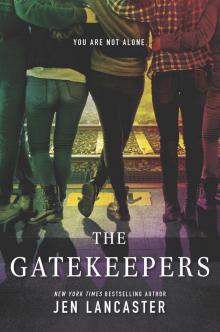 The Gatekeepers
The Gatekeepers